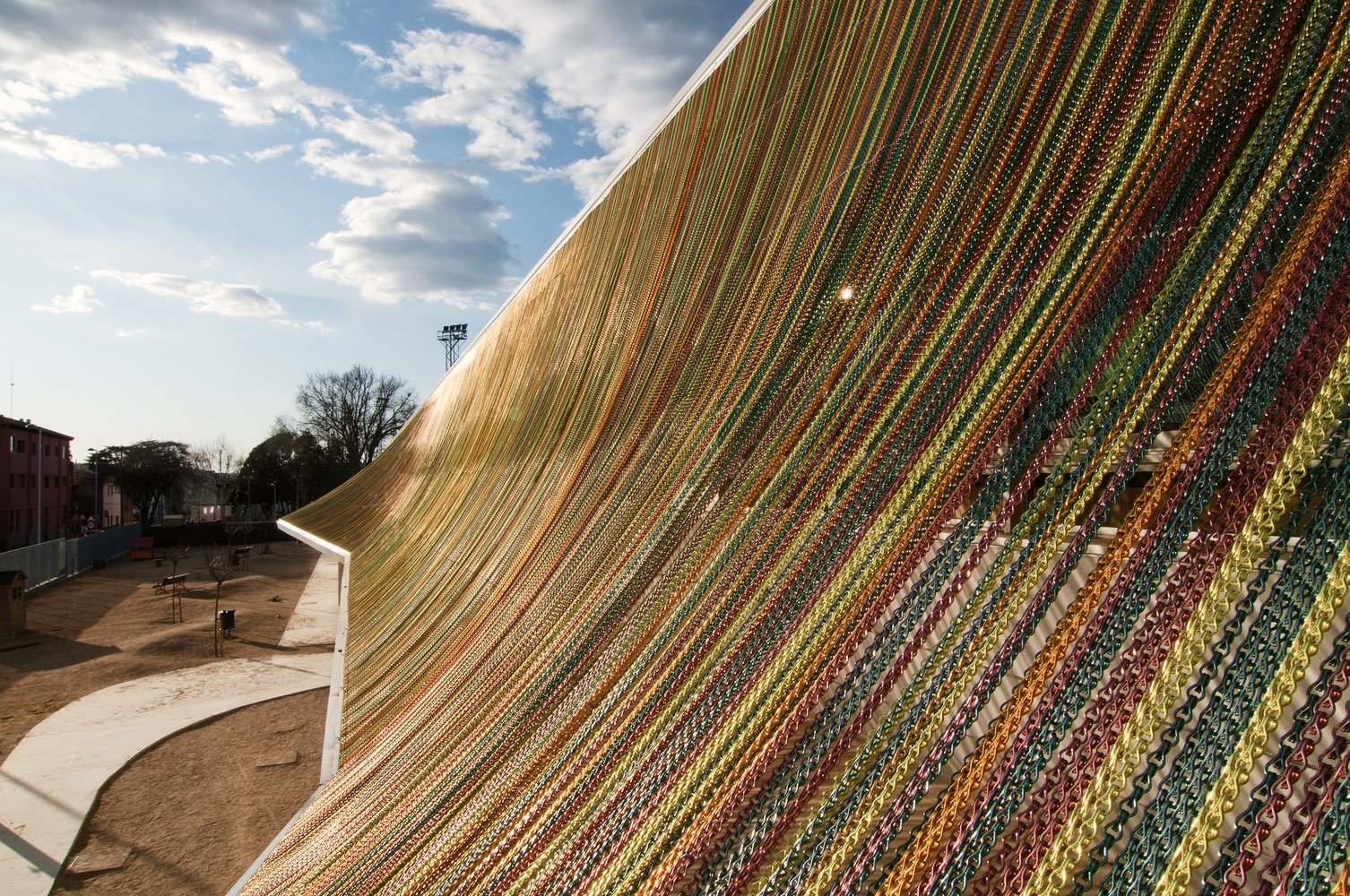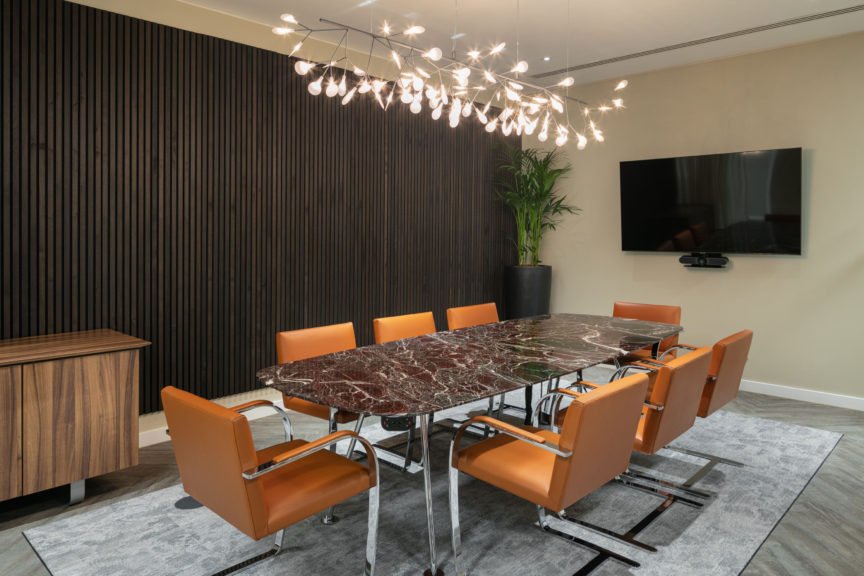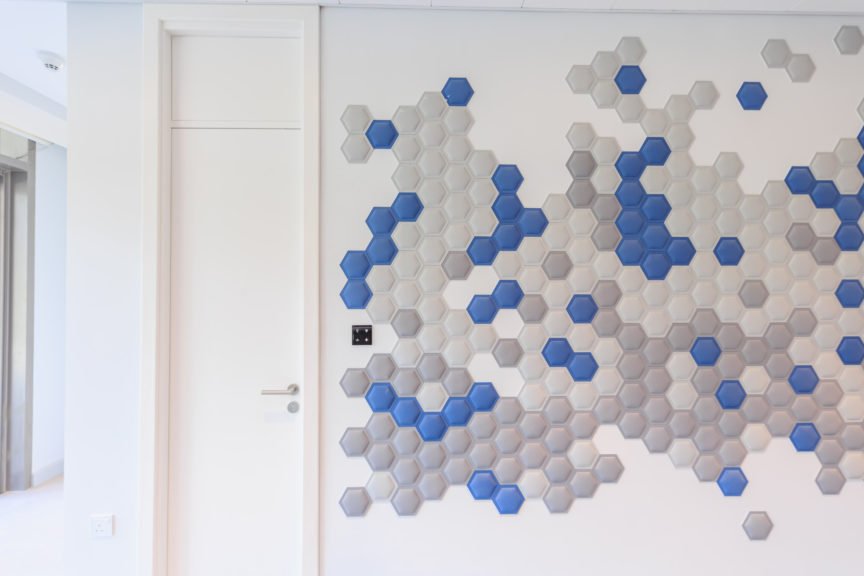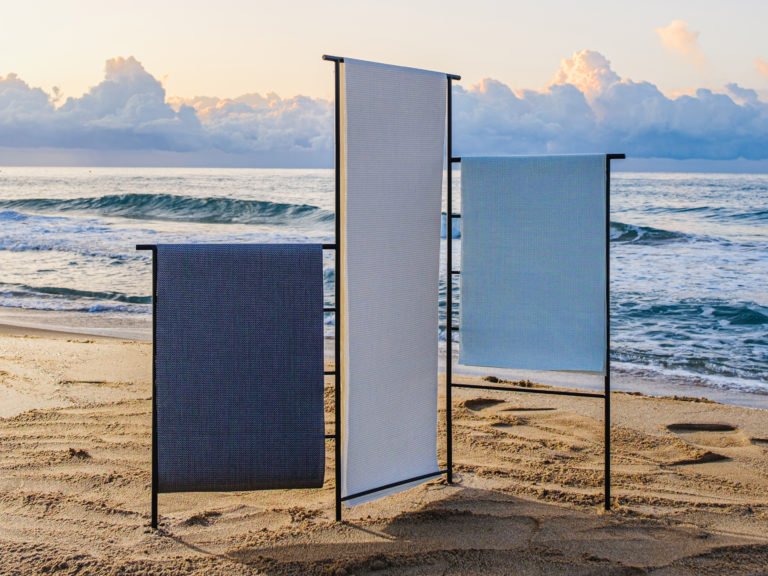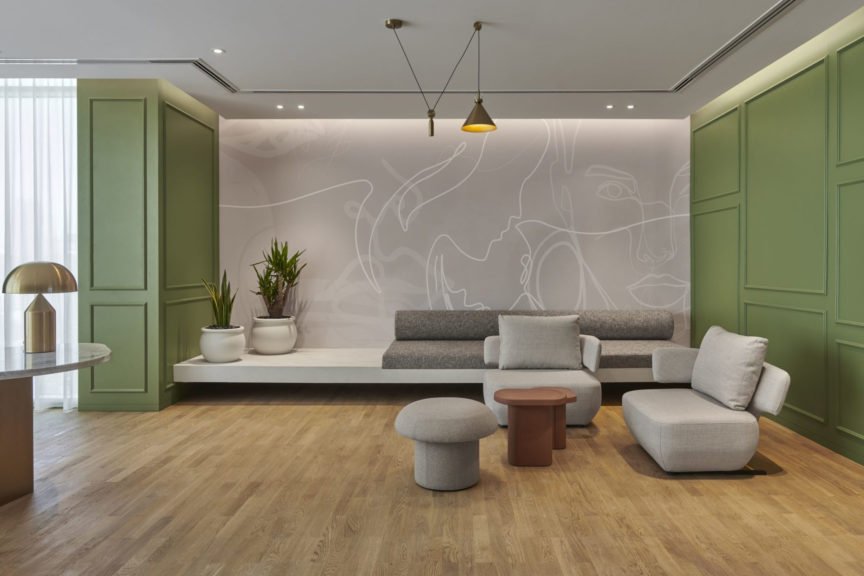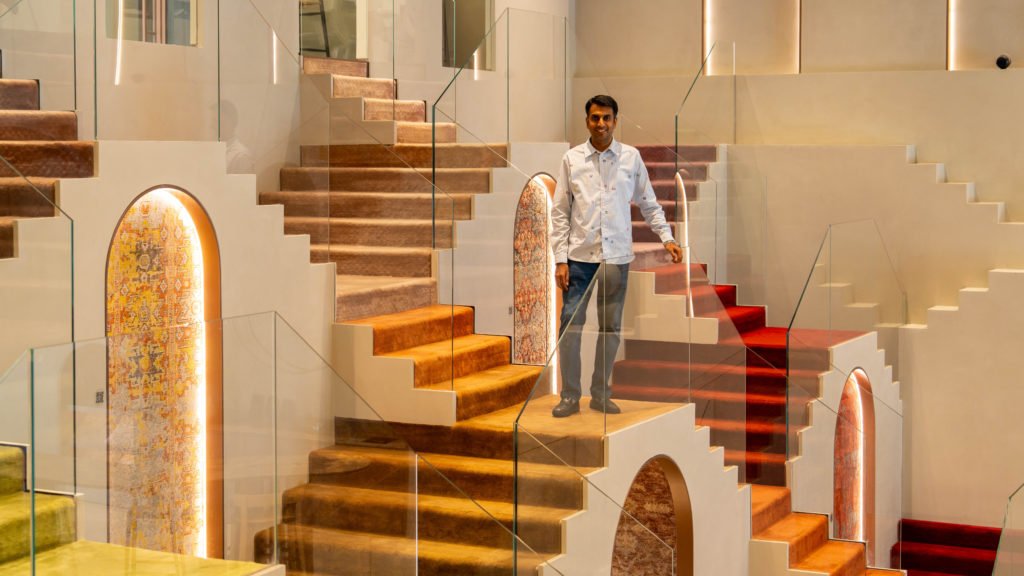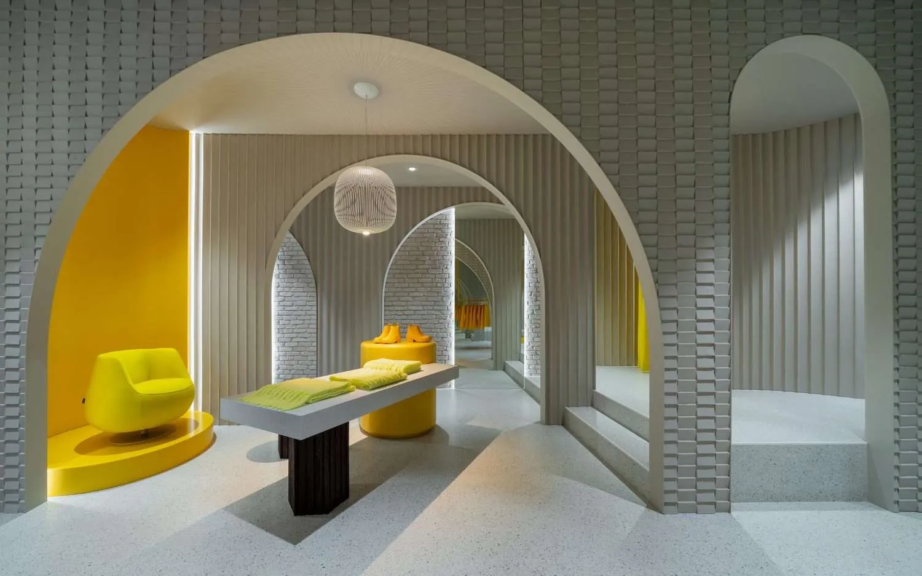Spanish design is rising to the top, whether it be quality or design, brands from Spain bring some of the most impressive products to the world. However, in a field as competitive as furniture and product design, it is a challenge to lead and to maintain conscious practices, especially when it comes to sustainability. Out of curiosity, we asked six of the top Spanish brands about the cultural influences in their design and how they imbue sustainability in their international businesses….
How are the brand’s Spanish roots reflected in the products or design ideology?
Kriskadecor
Josep Maria Sans, Director General: “From vast green valleys to high mountain landscapes and turquoise beaches, the Iberian Peninsula is known for its colourful landscapes. All these hues are reflected in our extensive colour palette. With it, our clients can create projects as diverse and full of contrasts as Spain is.
The transparency of the aluminium chains creates sub-spaces that maintain a sense of spaciousness and allow light to flow freely – something that we have adopted from the Mediterranean basin, where the company was born. The gentle movement of the chains is also similar to the waves of the Mediterranean Sea as they succumb to the sea breeze.”
Porcelanosa
Nuño Arcusa, General Manager, Middle East: “PORCELANOSA Grupo’s pieces follow the principles of elegance, timelessness and balance – concepts that define the design made in Spain. In line with the country’s fascination for the new and undiscovered, PORCELANOSA is also constantly on the lookout for new aesthetic references and models to create more avant-garde, functional and dynamic pieces.”
Lladró
Bertrand Legleye, Sales Director EMEA: “In our case, the Spanish roots are undoubtedly reflected in the maintenance of the local artisanal process, carried out in all our pieces, in Valencia, Spain, in the only Lladró factory for the whole world. Afterall, it is a craft that has been passed from generation to generation.
We have a global vision, but also a know-how and creative teams that drink from the passion and dedication so typical of the Spanish character. This culture of dedication and constant experimentation is reflected in all of our creations, and in the variety of their typologies – in the tone of creations such as Face to Face or Embraced, for example, or in the colour treatment of Jaime Hayon’s latest creation.”
Bivaq
Alberto Compte, CEO: “The Mediterranean environment in which Bivaq is located – the proximity to the sea, the temperate climate and its fertile land – invites us to feel the joy of living and leads us to create with the purpose of enjoying these attributes in our natural element: the outdoor space. This means our products are born through a slow process dedicated to creating pieces with an expressive capacity that extends beyond the material itself.”
ACTIU
Soledat Berbegal, Brand Reputation Director: “More than half a century has passed since Vicente Berbegal founded his small carpentry workshop in 1968 – a true marker of Spanish entrepreneurship and ambition to thrive. Since then, we have been designing and manufacturing with standardized, but also specific, references depending on each need. We are constantly evolving, showcasing to the world the Spaniard spirit of adapting and improvising. All our processes are our own, from the mechanization of wood, metal or tooling to the application of finishes. We take care of every last detail of each piece of furniture that leaves our production plant in Castalla, Alicante.”
What is the brand’s outlook on sustainability? How is it incorporated in the manufacturing of the products?
Kriskadecor
Josep Maria Sans, Director General: “Our goal at Kriskadecor is to minimize our environmental impact. Our chain links are 99.99% aluminium, of which 20% is recycled. Therefore, their production requires fewer resources and reduces our carbon footprint.
Aluminium, our main raw material, helps our circular economy with its high recyclability and no quality loss. Moreover, its recycling reduces energy consumption by 95% compared to the bauxite extraction process – the main source of aluminium in the world. We also use 100% green renewable energy for our processes.”
Porcelanosa
Nuño Arcusa, General Manager, Middle East: “PORCELANOSA Grupo has reoriented its production model towards a responsible consumption of energy and natural resources, the development of a decarbonized economy and the use of renewables in its facilities and distribution centers.
We are in line with the main Sustainable Development Goals that make up the UN’s 2030 Agenda. The companies that make up this holding company have regulated and limited the annual increase in CO2 emissions. Similarly, we have opted for the reuse of industrial water, as well as the installation of photovoltaic panels and the reuse of waste in the design of new products. PORCELANOSA Grupo places innovation and ceramic research as the central axes of its strategic plan to sustainability.”
Lladró
Bertrand Legleye, Sales Director EMEA: “Our goal has always been to create beauty with sustainability. In fact, Lladró has been applying many of today’s mandatory standards from its outset. We understand that the only way forward is to respect all the agents involved in the process of conception, production, and commercialization of our porcelain creations.
These principles are a part of the DNA of the brand, which is committed not only to ensuring its relevance over time but also to improving it. After all, a sustainable reality must be built day after day if we wish to look after the world and to pass it down safely to future generations.”
Andreu World
Jesús Llinares, CEO: “We work to lead sustainability in our sector. The 100% of our collections are in circular economy, with Cradle-to-Cradle certification. Many of our products are offered in versions that require coordination with a multitude of teams that specialize in fabrics, leathers, upholsteries, wood and more in addition to designers and production. Due to this, we had to collaborate and work with over 100 suppliers to ensure that the materials and finishes used on our products were healthy and free of restricted substances.
We started this process in 2004, but achieving circular design was all worth the effort. We have consistently operated in designing sustainable products which certainly eased the process. We are the first company in the world with a complete 100% FSC offering. We have developed our own fabrics from plastic PET bottles and textile waste.”
Bivaq
Alberto Compte, CEO: “All our collections work under a different concept but share aspects such as the careful selection of recycled materials by our fabrics and packaging that ensure the durability and resistance of the pieces, achieving no waste and, therefore, less pollution.
We also have the option to exchange and replace furniture pieces that have been purchased in the past, allowing us to reduce our daily impact on the environment. It is part of our vision to continue our commitment to implementing sustainable methods and to try to minimize our environmental footprint as much as possible.”
ACTIU
Soledat Berbegal, Brand Reputation Director: “In particular, Actiu’s Sustainability Policy focuses on the efficient use of resources. Its Technology Park is self-sufficient in the consumption of water for irrigation and generates, via solar panels, more electricity than it consumes. Our facilities have the Gaia by Actiu smart platform, which allows the conditions of workspaces to be monitored to promote well-being and energy efficiency.
Actiu also pays close attention to the entire life cycle of its products and materials linked to the values of the circular economy and local craftsmanship. Fluit, a chair with a 100% sustainable concept, designed by the Italian studio Archirivolto Design, which uses both recycled polypropylene and fibreglass, has been included in the ‘Delta Selection’ at the ADI 2022 awards.
Actiu’s Second Act philosophy gives a new lease of life to the fabrics that are left over from the upholstery processes that, thanks to the work of the Coba Complements creative team, are turned into toilet bags, tote bags, computer cases and backpacks.”
All in all, it seems like Spanish brands – Kriskadecor, Porcelanosa, Lladró, Andreu World, Bivaq and Actiu – are moving towards a future where their cultural roots are buttressed by sustainability and consciousness that aid our environment. When brands that have gone from local to international concentrate on being sustainable and rooted, it sets a standard – it inspires and carves a route for upcoming businesses to take the green route. Here’s to seeing more of Spanish design’s brilliance and their inculcated concern for the environment.
Article info
Article:
Date added:
15 December, 2022

